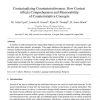Free Online Productivity Tools
i2Speak
i2Symbol
i2OCR
iTex2Img
iWeb2Print
iWeb2Shot
i2Type
iPdf2Split
iPdf2Merge
i2Bopomofo
i2Arabic
i2Style
i2Image
i2PDF
iLatex2Rtf
Sci2ools
COGSCI
2007
2007
Contextualizing Counterintuitiveness: How Context Affects Comprehension and Memorability of Counterintuitive Concepts
A number of anthropologists have argued that religious concepts are minimally counterintuitive and that this gives them mnemic advantages. This paper addresses the question of why people have the memory architecture that results in such concepts being more memorable than other types of concepts by pointing out the benefits of a memory structure that leads to better recall for minimally counterintuitive concepts and by showing how such benefits emerge in the real-time processing of comprehending narratives such as folk tales. This model suggests that memorability is not an inherent property of a concept; rather it is a property of the concept, the context in which the concept is presented, and the background knowledge that the comprehendor possesses about the concept. The model predicts how memorability of a concept should change if the context containing the concept were changed. The paper also presents the results of experiments carried out to test these predictions.
| Added | 12 Dec 2010 |
| Updated | 12 Dec 2010 |
| Type | Journal |
| Year | 2007 |
| Where | COGSCI |
| Authors | M. Afzal Upala, Lauren O. Gonce, Ryan D. Tweney, D. Jason Slone |
Comments (0)

